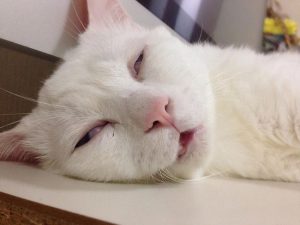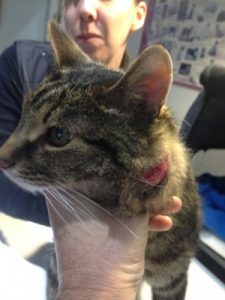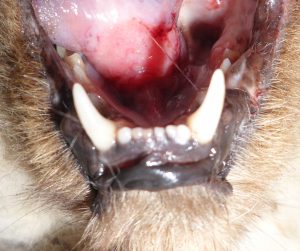When a cat drools when she sleeps she may look adorable but pet parents should see this as a warning sign. A cat drools because of two main reasons: (1) there is excessive production of saliva by the salivary glands, and (2) there is difficulty or an obstruction to swallowing. When a cat is sleeping, significantly less saliva is being produced compared to when she is awake. Unless her sleeping position causes saliva to drain from her mouth, it is uncommon that a cat drools.

Kitty drooling looks cute but it usually indicates a problem.
Excessive Saliva Production Even When Cat Is Asleep

Salivary gland infection or tumors increase saliva production.
Saliva is produced when salivary glands are stimulated. When a cat is awake, the saliva produced is swallowed. When a cat sleeps swallowing is not voluntary; the little amount of saliva produced should trickle down its throat. However, a cat drools when she sleeps due to the over production of saliva. Many factors can cause this increase. A tumor or an infection of the salivary gland can do this. Oral and upper gastrointestinal problems that can cause physical irritation of the salivary glands can cause excessive salivation. These include disease conditions involving the teeth and gums, tonsils, and other structures from the mouth down to the stomach.
Some medications can stimulate salivary glands, so if your cat recently took medication then check back with your veterinarian to see if the drooling could be a possible side effect. Chemical irritants like acid reflux from the stomach or poisons licked or swallowed may also cause increased salivation. Systemic problems like liver and kidney failure can cause toxins to build up in the blood and this can irritate salivary glands to produce excess saliva.
Obstruction to Normal Flow of Saliva Down To Throat
Anatomic abnormalities in the mouth and upper digestive tract can cause obstruction to the normal passage of saliva down throat. The cat drools when she sleeps due to abnormalities on the lips or misalignment of the jaws. Upper respiratory tract infections (URTI) which causes inflammation of the structures in the mouth and throat can obstruct proper drainage of saliva down the throat and clogs the nostrils resulting to open mouth breathing when the cat is asleep, both resulting to drooling.
Neuromuscular problems (e.g. nerve damage) or Tetanus and Rabies cause the inability to swallow/close the mouth, hence drooling. Foreign objects like strings,
plastics that may become caught up at the base of the tongue or lodged on the throat can also cause drooling. In the case of my cat, I was able to observe drooling both while he was awake and sleeping. Upon examination of his mouth I found a tumor growing under his tongue making it difficult for him to swallow.

Tumor growing under the tongue restricts its movement resulting to difficulty swallowing and hence drooling .
What Should I Do If My Cat Drools When She Sleeps?
At home, take note of any other associated signs of disease such as a general change in the cat’s behaviour. A change in appetite, difficulty swallowing, vomiting and regurgitation of food, pawing on face and mouth and any systemic and neurologic signs can suggest a bigger issue. Bring your cat to her veterinarian for a thorough head-to-tail check-up. The drooling when she sleeps may just be a so-called “idiopathic” overproduction of saliva or she needs to change her sleeping position. Keep dentist appointments and preventative vaccinations up to date. It is particularly important for Rabies, as frequently as your local legislation requires.



